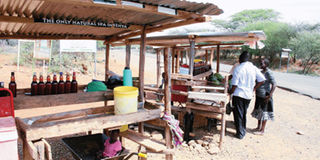Pollution and bush fires choke honey output in the Rift Valley

PHOTO | FILE Pollution of the environment is threatening to wipe out gains made in the honey sector.
What you need to know:
- Sporadic fires in Mt Kenya forest worsened matters for bee keepers in Laikipia East as heavy smoke was swept into hives, killing millions of bees
- Baringo, Laikipia, West Pokot, Turkana and Narok are some of the counties that produce quality honey
- In a bid to improve production, honey refineries have been set up in Marigat, Baringo County, and Ruai in Laikipia County
Heavy pollution of the environment is threatening honey production in Rift Valley Province.
Farmers, government officials and other stakeholders in the sector now want the matter addressed if output is to be enhanced.
They said that heavy presence of pesticides in the air and environmental degradation in bee keeping areas is affecting production.
Sporadic fires in Mt Kenya forest worsened matters for bee keepers in Laikipia East as heavy smoke was swept into hives, killing millions of bees.
“Some of the agrochemicals being used to spray large-scale farms and ranches are harmful and have affected production of honey by poisoning pollen which is the main food of the bees,” said the Rift Valley Province bee keeping officer, Mr David Muthima.
Speaking to Smart Company in Nakuru, Mr Muthima said that last year farmers in area earned Sh415 million from the sale of 4.1 million kilogrammes of honey.
Rift Valley provincial director of livestock Josiah Akoyo said demand for honey has doubled to about 8.1 million kilogrammes.
“This province has the potential to produce at least 33 million kilogrammes of honey annually if farmers had the right equipment and training,” he said.
At the same time, Mr Akoyo said honey production has been affected by poor marketing strategies.
He said that adulterated honey has penetrated the market, affecting the quality of the product sold in most outlets.
Baringo, Laikipia, West Pokot, Turkana and Narok are some of the counties that produce quality honey.
In a bid to improve production, honey refineries have been set up in Marigat, Baringo County, and Ruai in Laikipia County.
Tap huge potential
A third refinery is under construction in Kapenguria, Turkana County, to tap the huge potential in the area.
Laikipia Central bee keeping officer, Mr Daniel Kigera, said that sub-division of expansive ranches in the area has affected honey production.
“When huge ranches are sub-divided into small farms, bushes are cleared for crop production and this minimises the area under pollen,” said Mr Kigera.
He said aerial spraying of large scale wheat and flower farms has affected the sector as pesticides are spread by winds into hives.
Environmental degradation especially charcoal burning has also played a significant role in limiting production.
“When there is a lot of smoke in the air bees, will fly away from the hives and this has seen most of the farmers suffer huge losses,” said Mr Kigera.
Other challenges include lack of cooperatives for marketing purposes and use of poor harvesting equipment.
“A modern harvesting gear and other instruments cost between Sh5,000 to Sh6,000 which most farmers cannot afford due to high poverty levels,” said Mr Kigera.
The official said the latest extraction kit available in the market goes for between Sh45,000 - Sh50,000 while a raw kilogramme of honey goes for Sh130.
Mr Kigera said if the equipment were subsidised, many farmers would be able to acquire them and increase production.




